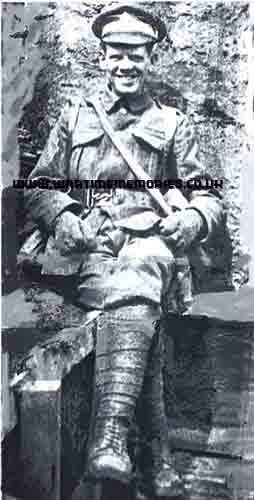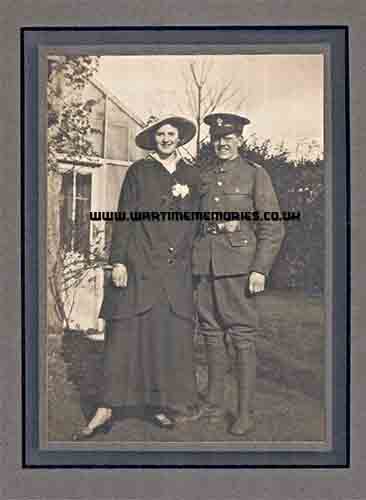Additions will be checked before being published on the website and where possible will be forwarded to the person who submitted the original entries. Your contact details will not be forwarded, but they can send a reply via this messaging system.
please scroll down to send a message
Pte. Harry S. Davison
British Army 26th (Banker's) Battalion Royal Fusiliers
from:Southsea, Gillingham, Bucks
Harry Davison enlisted in late December 1915 in 26th (Banker's) Battalion, The Royal Fusiliers. His decision to volunteer with bank colleagues as patriotic duty included a visit to wartime London. From December 1915 to early December 1916 he trained at the School of Cookery, at Camberwell and sent letters home describing training as cook. He then joined the Royal Fusiliers at the training camp, Aldershot, undertaking duties as company cook. Harry married shortly before embarkation. He continued to write home from the Western front, his letters cover the period of the Somme offensive, but without place names. Around Christmas 1916, Harry was under treatment for treatment for chest ailments and returned to England by hospital ship. Between January and March 1917 he was in two hospitals in Essex, the Military Hospital, Colchester followed by convalescence at Ardleigh Hospital. In April 1917 Harry was in Ireland at the Royal Fusiliers Depot, Tipperary, under medical supervision as convalescent and working as clerk to Depot Dental Surgeon. He was accepted for commission and posted to cadet school, and joined the Officer Cadet Battalion at Hertford College, Oxford as an Officer cadet.
After discharge from active service, it appears that 2nd Lieut Davison was transferred to the territorial battalion of the Suffolk Regiment. This regiment would have had a base near the Davison married home in Woodbridge, where he resumed his banking career and where his two sons were born.
The Rumbling Of The Guns. When a Portsmouth Bank Clerk Went to War - An article in the Portsmouth News.
There is nothing heroic about my action. I am going away and if necessary I offer my life for my country, simply because it is the smallest thing I can do to exhibit my manhood and my patriotism.
In these words my father in November 1915 explained to his wife-to-be his motives for volunteering to enlist in the armed forces. As a clerk with Lloyds Bank in Portsea Harry Davison joined, with many of his colleagues, the Bankers’ Battalion of the Royal Fusiliers – one of the many Pals’ Battalions in which so many groups went to war with the camaraderie of their shared profession. The discovery of a collection of letters written by my father to my mother over the following two years has given me a fresh insight into the life of an ordinary soldier on the Western Front.
Bank staff were, it seems, eager recruits. In his November 1915 letter my father refers to fellow-volunteers named Love and Pierce, from the bank’s King’s Road branch: so you see it won’t be too horribly dull and I shan’t be quite on my own. Then again: another member of our staff joined up last week, leaving only two out of five now. Private Love was later to be the victim of a near-fatal incident alongside my father in the trenches.
A succession of letters between December 2015 and February 1916 describe three months of training with the Royal Fusiliers in Aldershot; then came news that required a rapid and important decision. We have received orders to shift off abroad. We have no idea where we are going: France, Mesopotamia, Ireland . . . I have come to the conclusion that we must be married before I go to the Front . . . I am confident I shall return, let us hope uninjured.
After a hurried marriage to his sweetheart Olive, who also worked at Lloyds Bank, and a weekend honeymoon, Private Harry Davison in May 1916 proceeded to France with the Bankers’ Battalion, which saw action at the Battles of Flers-Courcellete and the Transloy Ridges on the Somme. From the Front, my father’s frequent letters tell a story in which descriptions of hardships in the trenches contrast with glimpses of everyday French country life not far behind the lines.
We are accustomed to images from the First World War that show the battleground as a quagmire of mud under ceaseless rain. It wasn’t like that all the time, however:
The weather keeps most gloriously fine. The sun shines all day long and it’s very, very hot, writes Private Harry Davison in June, 1916. We have another spell of delightful weather and I am walking around with just a shirt and trousers on, and even that seems too much . . . Today is warm and the sun is lovely and hot and this life is more like a picnic if it were not for the rumbling of the guns. The daytime has been too hot for either side to show much energy.
Gradually the heat of the day subsides. The best and quietest time has been about 6 to 9 at night, we generally get our pipes out and chat to our hearts’ content. During a period of rest from the trenches in the autumn there is even the opportunity to visit a nearby town, passing through open countryside on the way. The harvest is in full swing . . . I don’t think I ever saw more wheat in my life. It runs for miles without a hedge.
As winter comes on, the picture changes for the worse. The mud and rain the last few days have been terrible. . . Yesterday during a thunderstorm the rain was absolutely torrential, and the mud made the roads nearly impassable . . . Will you please send me a pair of Anderson’s trench waders as advertised in London Opinion; the water is very bad indeed, and I think they will combat the evil of trench feet. This request was quickly answered. The mud is simply appalling, knee deep in many places. Those waders have proved most useful and are really waterproof.
In October came the accident that befell my Father’s colleague from Portsmouth. Poor old Love is back with us again after a few days in hospital. He had the misfortune to be buried alive under 5ft of earth and needless to say when dug out was not in the best of health or temper. It has altered him a lot, but I expect he will be himself again after a while. At the present moment he is sitting with me in my billet in a French ‘chateau’ where we are resting for a few days while on the march to a fresh position. However, a few weeks later all is apparently not well. Love keeps most cheerful but at the same time he is not the same as before his terrible experience. It seems to have affected his nerves.
‘. . . . if it were not for the rumbling of the guns’. The ever-present background to these letters is the desperate struggle in progress, in this year of the terrible Battle of the Somme. A severe bombardment has been in progress for the past 12 hours on our left, so expect to hear of some gains in a day or two . . . Our period at the Front line would I suppose by the authorities be called comparatively quiet; however I am not anxious to be there when it is really noisy. About nine the machine guns get busy and the Very lights start going up. Our artillery are all around us and Mr Fritz with his artillery keeps trying to find ours.
In the intervals between spells in action there is a welcome normality about everyday life. After securing a new pair of trousers I went over to –––, a large town about 5km away. After having a good tea and inspecting the various places of interest we returned in the evening. . . I had the misfortune to lose my wrist watch, but am waiting to go into town to replace it.
The troops took what relief was afforded them when they could. It takes very little to excite one out here, and even the prospect of an evening in some shelled village with bacon and eggs and very mild beer causes as much pleasure as a real bash at home.
Parcels from home were eagerly awaited and seem to have arrived regularly. Your parcel containing biscuits, socks etc just to hand. Thanks awfully. The biscuits are a treat . . . It was fortunate you sent out my spare pair of glasses, as a short while ago I lost my other pair in the dark . . . In the next parcel will you send please one towel and some cocoa, coffee or tea cubes. Some cake would be acceptable too . . . You might send a few pairs of socks and one or two handkerchiefs.
With the parcels came news from the home front, and from other theatres of war, to which my father responded: The various restrictions prevailing in England must be hard . . . England seems to have solved the Zeppelin problem, now perhaps the Zepps will not be such frequent visitors . . . What good work the Russians are doing. If we hold our own until they move up great events will take place, I think.
Of the naval Battle of Jutland [May 31, 1916], the first news we had came from the Germans over the trenches and was of course exaggerated. Since then we have had our own official news and after all we were victors, but what awful sacrifice of valuable lives. Clearly, though, the newspapers of 1916 erred on the side of optimism. Everything in the papers seems to point to an early peace, and personally I think another two months will see us back in dear old England.
Some upbeat messages were perhaps designed to cheer my mother in her lonely vigil at home, but knowing as we now do the conditions our troops suffered it is not hard to read between the lines. We are equipped for the winter now and you should see me in full war paint: gum boots up to the waist and heavy leather jacket over tunic with cap comforter under tin hat . . . I managed to get a fair night’s sleep last night in a disused trench . . . We expect to go into the trenches very shortly but have no fear, it’s much safer in the trenches than outside them . . . We have some very decent dugouts; mine in fact is one of the best I have ever had, as you can stand up in it.
The prospect of leave is a recurring theme. As Christmas 1916 approaches, the only topic of conversation in the camp is England and our prospects of leave. And then, hopefully, there is a possibility of my being in England for Christmas. But it was not to be. On Christmas Eve my father writes: It seems impossible to think tomorrow is Christmas Day. The weather – well, ’nuff said. A terrific wind prevails, and the rain has been really appalling. Now I must shut up. All the others in the dugout are asleep. It’s getting cold and my last candle is nearing its end, and I must save some for tomorrow morning.
My father’s next letters are from a military hospital in Essex in February 1917. He had been invalided home – not wounded, it appears, but suffering from some acute respiratory complaint. Could it have been the effect of gas? We shall never know. Anyway, it rescued him from the trenches; he lived to the age of 60 and fathered two sons. He never spoke to us of his war experiences. A century later I am at last beginning to understand why.

